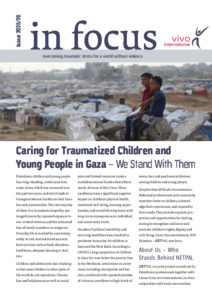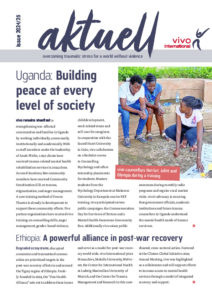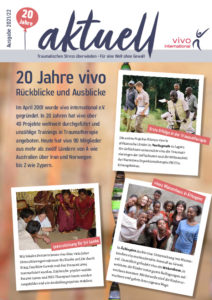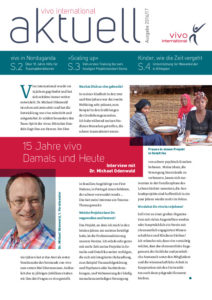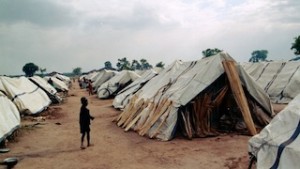In the current newsletter, we report on how active vivo members have been worldwide this year.
Enjoy reading!
Germany
The new newsletter arrived!
In the current newsletter, we report on how active vivo members have been worldwide this year.
Enjoy reading!
Integration Award of the State of Baden-Württemberg
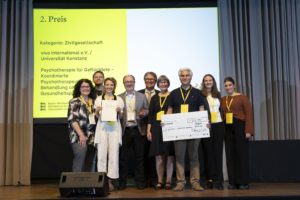
vivo project is 2nd in the category ‘civil society’!
Lesen Sie weiter: Integration Award of the State of Baden-Württemberg

vivo project is 2nd in the category ‘civil society’!
Continue reading: Integration Award of the State of Baden-Württemberg
Studies about NETfacts and FORNET
Robjant, K., Schmitt, S., Carleial, S., Elbert, T., Abreu, L., Chibashimba, A., … & Koebach, A. (2022).
NETfacts: An integrated intervention at the individual and collective level to treat communities affected by organized violence.
PNAS, 119 (44)
Koebach A & Robjant K (2021).
NETfacts: a community intervention integrating trauma treatment at the individual and collective level.
European Journal of Psychotraumatology, 12(1)
Koebach, A., Carleial, S., Elbert, T., Schmitt, S., & Robjant, K. (2021).
Treating trauma and aggression with narrative exposure therapy in former child and adult soldiers: A randomized controlled trial in Eastern DR Congo.
Journal of Consulting and Clinical Psychology, 89(3), 143–155
Robjant, K., Koebach, A., Schmitt, S., Chibashimba, A., Carleial, S., & Elbert, T. (2019).
The treatment of posttraumatic stress symptoms and aggression in female former child soldiers using adapted Narrative Exposure therapy–a RCT in Eastern Democratic Republic of Congo.
Behaviour research and therapy, 123, 103482
Robjant, K., Schmitt, S., Carleial, S., Elbert, T., Abreu, L., Chibashimba, A., … & Koebach, A. (2022).
NETfacts: An integrated intervention at the individual and collective level to treat communities affected by organized violence.
PNAS, 119 (44)
Koebach A & Robjant K (2021).
NETfacts: a community intervention integrating trauma treatment at the individual and collective level.
European Journal of Psychotraumatology, 12(1)
Koebach, A., Carleial, S., Elbert, T., Schmitt, S., & Robjant, K. (2021).
Treating trauma and aggression with narrative exposure therapy in former child and adult soldiers: A randomized controlled trial in Eastern DR Congo.
Journal of Consulting and Clinical Psychology, 89(3), 143–155
Robjant, K., Koebach, A., Schmitt, S., Chibashimba, A., Carleial, S., & Elbert, T. (2019).
The treatment of posttraumatic stress symptoms and aggression in female former child soldiers using adapted Narrative Exposure therapy–a RCT in Eastern Democratic Republic of Congo.
Behaviour research and therapy, 123, 103482
Trauma therapy training for Ukraine
vivo international is implementing an extensive NET curriculum for Ukrainian mental health professionals to support civilians and military members suffering from trauma-related disorders. Lesen Sie weiter: Trauma therapy training for Ukraine
vivo international is implementing an extensive NET curriculum for Ukrainian mental health professionals to support civilians and military members suffering from trauma-related disorders. Continue reading: Trauma therapy training for Ukraine
We have a new newsletter!
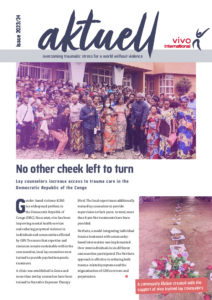
This year we report on vivo activities around the world, for example in the DR Congo, Burundi and Ukraine. In the portrait we introduce vivo member Amani Chibashimba.
Enjoy reading!
Success of peer support for refugees
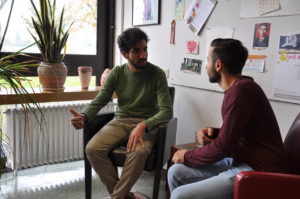
Since 2017, vivo international has established an innovative care model for coordinated psychotherapeutic care for refugees in the district of Constance with the involvement of supervised peers. You can read about the development of the project here.
In 2021, the group of supervised peers was expanded to a total of 20, who were also qualified as language mediators. Additionally to the project activities such as networking meetings and information events, intervision for therapists and supervision for supervised peers and language mediators, a randomised controlled trial started in March 2021 to investigate the effectiveness of coordinated psychotherapeutic care involving supervised peers in comparison to standard treatment.

Since 2017, vivo international has established an innovative care model for coordinated psychotherapeutic care for refugees in the district of Constance with the involvement of supervised peers. You can read about the development of the project here.
In 2021, the group of supervised peers was expanded to a total of 20, who were also qualified as language mediators. Additionally to the project activities such as networking meetings and information events, intervision for therapists and supervision for supervised peers and language mediators, a randomised controlled trial started in March 2021 to investigate the effectiveness of coordinated psychotherapeutic care involving supervised peers in comparison to standard treatment.
The German newsletter is available
In this year’s German newsletter we would like to celebrate vivo’s 20th anniversary with some throwbacks and insights. In the portrait we present Anselm Crombach and his work in Burundi and the Democratic Republic of Congo.
In this year’s German newsletter we would like to celebrate vivo’s 20th anniversary with some throwbacks and insights. In the portrait we present Anselm Crombach and his work in Burundi and the Democratic Republic of Congo.
Fearless – Support for young refugees
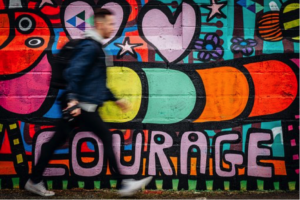
Since 2020, vivo international e.V., in cooperation with the University of Konstanz and the psychotherapy training institutes in Baden-Württemberg, has been addressing the mental health of young refugees who are seeking protection and asylum in Baden-Württemberg without parents or care. Lesen Sie weiter: Fearless – Support for young refugees

Since 2020, vivo international e.V., in cooperation with the University of Konstanz and the psychotherapy training institutes in Baden-Württemberg, has been addressing the mental health of young refugees who are seeking protection and asylum in Baden-Württemberg without parents or care. Continue reading: Fearless – Support for young refugees
vivo is 20 years old!
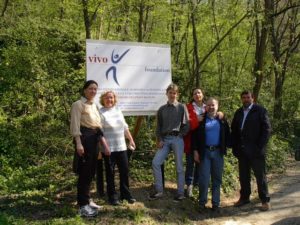
In April 2001, the foundation for vivo was laid in Italy. Congratulations and many thanks to all who have enriched and enabled vivo’s work over the past 20 years!

In April 2001, the foundation for vivo was laid in Italy. Congratulations and many thanks to all who have enriched and enabled vivo’s work over the past 20 years!
The project continues!
The model project to improve psychotherapeutic care for refugees enters a new phase.
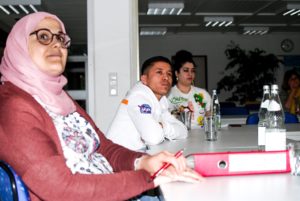
The model project to improve psychotherapeutic care for refugees enters a new phase.

Traumatherapy and pregnancy
Stevens, N.R., Miller, M.L., Puetz, A.‐K., Padin, A.C., Adams, N. and Meyer, D.J. (2021)
Psychological Intervention and Treatment for Posttraumatic Stress Disorder During Pregnancy: A Systematic Review and Call to Action.
Journal of Traumatic Stress
Susanne Breinlinger, Ann-Kathrin Pütz, Natalie R. Stevens, Daniela Mier, Inga Schalinski, Michael Odenwald
Narrative Exposure Therapy in challenging cases and conditions.
MALTRATTAMENTO E ABUSO ALL’INFANZIA; 3/2020
Stevens, N.R., Miller, M.L., Puetz, A.‐K., Padin, A.C., Adams, N. and Meyer, D.J. (2021)
Psychological Intervention and Treatment for Posttraumatic Stress Disorder During Pregnancy: A Systematic Review and Call to Action.
Journal of Traumatic Stress
Susanne Breinlinger, Ann-Kathrin Pütz, Natalie R. Stevens, Daniela Mier, Inga Schalinski, Michael Odenwald
Narrative Exposure Therapy in challenging cases and conditions.
MALTRATTAMENTO E ABUSO ALL’INFANZIA; 3/2020
Support for more than 90 women
The project to improve psychotherapeutic care for refugee pregnant women and mothers will be successfully completed at the end of April 2021.
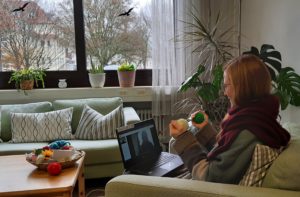
Since 2016, vivo has offered comprehensive psychological and trauma therapy support with the help of translators. The project also includes help with referral to psychotherapists in private practice. Professionals such as psychotherapists can take part in training on the topics of recognising traumatisation, dealing with trauma consequences and their effects on the family.
The project to improve psychotherapeutic care for refugee pregnant women and mothers will be successfully completed at the end of April 2021.

Since 2016, vivo has offered comprehensive psychological and trauma therapy support with the help of translators. The project also includes help with referral to psychotherapists in private practice. Professionals such as psychotherapists can take part in training on the topics of recognising traumatisation, dealing with trauma consequences and their effects on the family.
Mental health of refugees in Germany
Kaltenbach, E., Hermenau, K., Schauer, M., Dohrmann, K., Elbert, T., Schalinski, I. (2020).
Trajectories of posttraumatic stress symptoms during and after Narrative Exposure Therapy (NET) in refugees.
BMC Psychiatry 20:312
Kaltenbach, E., Hermenau, K., Schauer, M., Elbert, T., Schalinski, I. (2018).
Course of Mental Health in Refugees—A One Year Panel Survey.
Front. Psychiatry 9:352
Kaltenbach, E., Hermenau, K., Schauer, M., Dohrmann, K., Elbert, T., Schalinski, I. (2020).
Trajectories of posttraumatic stress symptoms during and after Narrative Exposure Therapy (NET) in refugees.
BMC Psychiatry 20:312
Kaltenbach, E., Hermenau, K., Schauer, M., Elbert, T., Schalinski, I. (2018).
Course of Mental Health in Refugees—A One Year Panel Survey.
Front. Psychiatry 9:352
Findings on Narrative Exposure Therapy
Schneider, A., Pfeiffer, A., Conrad, D., Elbert, T., Kolassa, I.-T., Wilker, S. (2020).
Does cumulative exposure to traumatic stressors predict treatment outcome of community-implemented exposure-based therapy for PTSD?
European Journal of Psychotraumatology, 11:1, 1789323
Siehl, S., Robjant, K., Crombach, A. (2020).
Systematic review and meta-analyses of the long-term efficacy of narrative exposure therapy for adults, children and perpetrators
Psychotherapy Research
Schneider, A., Pfeiffer, A., Conrad, D., Elbert, T., Kolassa, I.-T., Wilker, S. (2020).
Does cumulative exposure to traumatic stressors predict treatment outcome of community-implemented exposure-based therapy for PTSD?
European Journal of Psychotraumatology, 11:1, 1789323
Siehl, S., Robjant, K., Crombach, A. (2020).
Systematic review and meta-analyses of the long-term efficacy of narrative exposure therapy for adults, children and perpetrators
Psychotherapy Research
vivos work during the corona pademic
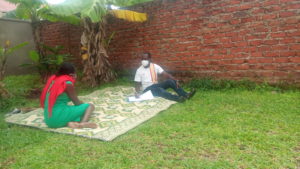
On our Facebook page we report what the COVID-19 pandemic has changed in different projects.
Read all articles at
https://www.facebook.com/vivokonstanz/

On our Facebook page we report what the COVID-19 pandemic has changed in different projects.
Read all articles at
https://www.facebook.com/vivokonstanz/
PTSD awareness month
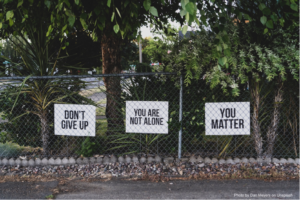
June is PTSD awareness month. Since a core topic of vivo international e.V. is the treatment of trauma sequelae, we would like to present to you on facebook this month projects of our association that deal with the treatment of trauma survivors.
Follow us on facebook!
https://www.facebook.com/vivokonstanz/

June is PTSD awareness month. Since a core topic of vivo international e.V. is the treatment of trauma sequelae, we would like to present to you on facebook this month projects of our association that deal with the treatment of trauma survivors.
Follow us on facebook!
https://www.facebook.com/vivokonstanz/
Improved care for burdened refugees
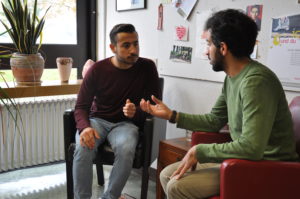
The pilot project for the support of psychologically burdened refugees, has been implemented throughout the district of Constance since the summer of 2017. The aim of the project to improve access to the health system for refugees has been successfully implemented. The project networks, qualifies and supports the existing resources in the district of Constance.

The pilot project for the support of psychologically burdened refugees, has been implemented throughout the district of Constance since the summer of 2017. The aim of the project to improve access to the health system for refugees has been successfully implemented. The project networks, qualifies and supports the existing resources in the district of Constance.
Conference in Norway “NET developments and clinical practice”
Organized by Hakon Stenmark (RVTS: Center for Violence, Traumatic Stress and Suicide Prevention Mid Norway) and Per Mossegaard (resource Center for Trauma Support, Sweden) together with vivo international e.V. a 2-days conference entitled „NET- developments and clinical practice“ was held on October 24 and 25 at the Quality Hotel Augustin in Trondheim, Norway. The 74 participants, scientists and practitioners working in mental health institutions in Norway, Sweden, Denmark and Finland, Germany, The Netherlands, England, USA, and the Democratic Republic of Kongo greatly benefitted from a rich program: Informative and inspiring field reports on the implementation of NET (and its variants) in various settings and contexts, and its efficiency in different populations suffering from the consequences of trauma and violence, were crowned by impressive key notes by Katy Robjant (Freedom from Torture, London, UK) on human trafficking, and Thomas Elbert (vivo international e.V. and University of Konstanz, Germany) on the societal roots and the societal implications of violence and traumatization. Presentations provided an inspiring basis for intense exchange among participants, new contacts and future collaborations. The audience greatly acknowledged the initiative and the arrangement with much applause and appreciation for the organizers.
Organized by Hakon Stenmark (RVTS: Center for Violence, Traumatic Stress and Suicide Prevention Mid Norway) and Per Mossegaard (resource Center for Trauma Support, Sweden) together with vivo international e.V. a 2-days conference entitled „NET- developments and clinical practice“ was held on October 24 and 25 at the Quality Hotel Augustin in Trondheim, Norway. The 74 participants, scientists and practitioners working in mental health institutions in Norway, Sweden, Denmark and Finland, Germany, The Netherlands, England, USA, and the Democratic Republic of Kongo greatly benefitted from a rich program: Informative and inspiring field reports on the implementation of NET (and its variants) in various settings and contexts, and its efficiency in different populations suffering from the consequences of trauma and violence, were crowned by impressive key notes by Katy Robjant (Freedom from Torture, London, UK) on human trafficking, and Thomas Elbert (vivo international e.V. and University of Konstanz, Germany) on the societal roots and the societal implications of violence and traumatization. Presentations provided an inspiring basis for intense exchange among participants, new contacts and future collaborations. The audience greatly acknowledged the initiative and the arrangement with much applause and appreciation for the organizers.
Project to support refugee pregnant women and mothers extended until 2021
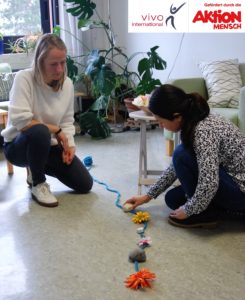
We are very happy about the further support of our project for traumatized pregnant women and mothers through Aktion Mensch.
In the last three years we have been able to reach more than 50 refugees with our therapeutic offers and train more than 600 full-time and volunteers in lectures and workshops on the subject of traumatisation.
Lesen Sie weiter: Project to support refugee pregnant women and mothers extended until 2021

We are very happy about the further support of our project for traumatized pregnant women and mothers through Aktion Mensch.
In the last three years we have been able to reach more than 50 refugees with our therapeutic offers and train more than 600 full-time and volunteers in lectures and workshops on the subject of traumatisation.
Continue reading: Project to support refugee pregnant women and mothers extended until 2021
Support for refugee pregnant women and young mothers
The time of pregnancy and birth is a vulnerable time for the healthy development of the child as well as the mental and physical health of mother and child. Women who have had to flee from war and crises have an enormous strength to take care of their families under the most difficult conditions. Two and a half years ago vivo international together with Aktion Mensch started a project to support traumatized refugee pregnant women and young mothers.
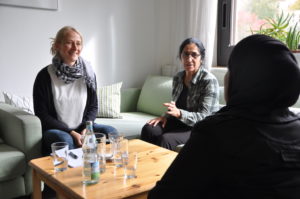
Lesen Sie weiter: Support for refugee pregnant women and young mothers
The time of pregnancy and birth is a vulnerable time for the healthy development of the child as well as the mental and physical health of mother and child. Women who have had to flee from war and crises have an enormous strength to take care of their families under the most difficult conditions. Two and a half years ago vivo international together with Aktion Mensch started a project to support traumatized refugee pregnant women and young mothers.

Continue reading: Support for refugee pregnant women and young mothers
vivo at the Humanitarian Congress Berlin 2018
This year, the 20th anniversary of the Humanitarian Congress Berlin took place. The Congress is held by Médecins Sans Frontières/ Doctors without Borders (MSF), Doctors of the World, the German Red Cross and the Berlin Chamber of Physicians and is a platform for international NGOs to discuss the major issues and challenges of humanitarian action. vivo international presented itself as an NGO with an information booth and two talks.
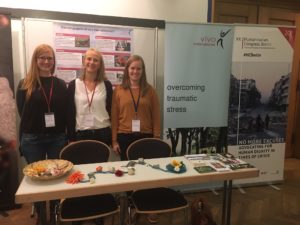
Lesen Sie weiter: vivo at the Humanitarian Congress Berlin 2018
This year, the 20th anniversary of the Humanitarian Congress Berlin took place. The Congress is held by Médecins Sans Frontières/ Doctors without Borders (MSF), Doctors of the World, the German Red Cross and the Berlin Chamber of Physicians and is a platform for international NGOs to discuss the major issues and challenges of humanitarian action. vivo international presented itself as an NGO with an information booth and two talks.

Continue reading: vivo at the Humanitarian Congress Berlin 2018
Support for refugees in Bielefeld
vivo supports the refugee outpatient clinic of the University Bielefeld
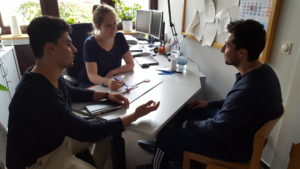
vivo and the research group for Clinical Psychology at the University of Bielefeld cooperate closely. Currently several projects are conducted with the aim to offer psychological support for affected refugees and asylum seekers.
vivo supports the refugee outpatient clinic of the University Bielefeld

vivo and the research group for Clinical Psychology at the University of Bielefeld cooperate closely. Currently several projects are conducted with the aim to offer psychological support for affected refugees and asylum seekers.
vivo board member Heike Riedke reports experiences in DRC
On Wednesday, June 28th 2017, Heike Riedke was invited by the German Central Office for Combating War Crimes and Other Offenses according to the Code of Crimes against International Law to a course on “International Criminal Law” to share her experiences made in the Democratic Republic of the Congo (DRC).
The course, which lasted several days, focused on one day on the topic of “Psychological characteristics for interviewing victims”. Based on the yearlong work experiences that vivo International has in DRC, especially in the treatment of victims of sexual violence in a civilian as well as in the war context, Heike Riedke described her experiences that she had made during her many visits and was therefore well prepared to answer the subsequent questions of the 30 participants.
On Wednesday, June 28th 2017, Heike Riedke was invited by the German Central Office for Combating War Crimes and Other Offenses according to the Code of Crimes against International Law to a course on “International Criminal Law” to share her experiences made in the Democratic Republic of the Congo (DRC).
The course, which lasted several days, focused on one day on the topic of “Psychological characteristics for interviewing victims”. Based on the yearlong work experiences that vivo International has in DRC, especially in the treatment of victims of sexual violence in a civilian as well as in the war context, Heike Riedke described her experiences that she had made during her many visits and was therefore well prepared to answer the subsequent questions of the 30 participants.
vivo-member receives an award
During the annual meeting 2017 in Zurich of the German speaking society for psychotraumatology (Deutschsprachige Gesellschaft für Psychotraumatologie – DeGPT) vivo-member Dr Tobias Hecker received an award for his work in Tanzania „Consequences and prevention of violence in education: Contributing to a childhood free of violence for vulnerable children in low-income countries – the example of Tanzania”. Congratulations!
During the annual meeting 2017 in Zurich of the German speaking society for psychotraumatology (Deutschsprachige Gesellschaft für Psychotraumatologie – DeGPT) vivo-member Dr Tobias Hecker received an award for his work in Tanzania „Consequences and prevention of violence in education: Contributing to a childhood free of violence for vulnerable children in low-income countries – the example of Tanzania”. Congratulations!
The new German newsletter arrived!
We would like to present our annual German vivo newsletter. This year, we look at the development of vivo projects over the years in Northern Uganda, DR Congo and Ethiopia.
You can access the newsletter through this link.
We would like to present our annual German vivo newsletter. This year, we look at the development of vivo projects over the years in Northern Uganda, DR Congo and Ethiopia.
You can access the newsletter through this link.
Honorary awards for two vivo-members
Two vivo founding members Prof. Dr. Thomas Elbert and Dr. Maggie Schauer received the Carl Friedrich von Weizsäcker-Prize for their outstanding research on the consequences of traumatic experiences. The German National Academy of Sciences Leopoldina and the “Stifterverband für die Deutsche Wissenschaft” give the Carl Friedrich von Weizsäcker-Prize to researchers who “have made a significant scientific contribution to tackling the great challenges facing society today”.
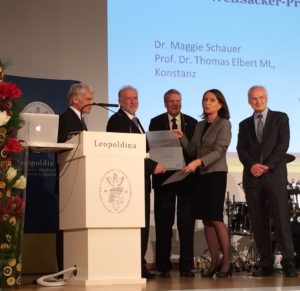
Many congratulations to both!
Two vivo founding members Prof. Dr. Thomas Elbert and Dr. Maggie Schauer received the Carl Friedrich von Weizsäcker-Prize for their outstanding research on the consequences of traumatic experiences. The German National Academy of Sciences Leopoldina and the “Stifterverband für die Deutsche Wissenschaft” give the Carl Friedrich von Weizsäcker-Prize to researchers who “have made a significant scientific contribution to tackling the great challenges facing society today”.

Many congratulations to both!
Therapy for traumatized refugees
German article on the dissemination of psychotherapy modules for traumatized refugees. Experience gained from trauma work in crisis and conflict regions.
Elbert, T., Wilker, S., Schauer, M., Neuner, F. (2016)
Dissemination psychotherapeutischer Module für traumatisierte Geflüchtete. Erkenntnisse aus der Traumaarbeit in Krisen- und Kriegsregionen.
Nervenarzt.
German article on the dissemination of psychotherapy modules for traumatized refugees. Experience gained from trauma work in crisis and conflict regions.
Elbert, T., Wilker, S., Schauer, M., Neuner, F. (2016)
Dissemination psychotherapeutischer Module für traumatisierte Geflüchtete. Erkenntnisse aus der Traumaarbeit in Krisen- und Kriegsregionen.
Nervenarzt.
Support for pregnant and traumatised refugee women
Currently, the district of Konstanz receives more traumatised refugee women. Many of these women are pregnant or young mothers and are severely burdened. The physical as well as the psychological condition of the pregnant women is of high importance for the future physical and psychological health of mothers and children. Furthermore, mothers who experienced stress and violence often show limited parental skills.
The project is supported by the organisation „Aktion Mensch“ and aims to diagnose and treat psychological problems of pregnant or mothering refugee women. First, the women participate in psycho-diagnostic interviews at the centre of competence psychotraumatology of the University of Kontanz and vivo international. Subsequently, they can receive individual psychological counselling, treatment and referral to the support network „Frühe Hilfen“ to prevent further stress and attachment problems.
Additionally, courses and lectures for social workers, volunteers, and professionals like doctors and midwives are held to share the developed treatment approaches.
Currently, the district of Konstanz receives more traumatised refugee women. Many of these women are pregnant or young mothers and are severely burdened. The physical as well as the psychological condition of the pregnant women is of high importance for the future physical and psychological health of mothers and children. Furthermore, mothers who experienced stress and violence often show limited parental skills.
The project is supported by the organisation „Aktion Mensch“ and aims to diagnose and treat psychological problems of pregnant or mothering refugee women. First, the women participate in psycho-diagnostic interviews at the centre of competence psychotraumatology of the University of Kontanz and vivo international. Subsequently, they can receive individual psychological counselling, treatment and referral to the support network „Frühe Hilfen“ to prevent further stress and attachment problems.
Additionally, courses and lectures for social workers, volunteers, and professionals like doctors and midwives are held to share the developed treatment approaches.
The Nairobi Position Statement on Refugee and IDP Mental Health Care
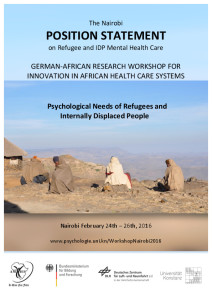
This statement is the product of a first workshop initiated by the German Federal Ministry of Education and Research that brought together a group of established and young researchers, clinicians and NGOs discussing ways to integrate the mental health care of displaced people into African national mental health care systems. In this paper, the group called for a better cooperation between national mental health care systems and international organizations supporting the mental health of displaced people. They criticized the situation that in many countries parallel mental health care systems are established and that both systems suffered from lack of resources. The group recommended that national mental health systems should be build up and further developed in the context of serving displaced peoples’ mental health needs. They identified several obstacles, e.g. the unwillingness of governments to prioritize mental health care and the challenge for NGOs to cooperate with government structures.
For the Nairobi Position Statement on Refugee and IDP Mental Health Care please follow this link.

This statement is the product of a first workshop initiated by the German Federal Ministry of Education and Research that brought together a group of established and young researchers, clinicians and NGOs discussing ways to integrate the mental health care of displaced people into African national mental health care systems. In this paper, the group called for a better cooperation between national mental health care systems and international organizations supporting the mental health of displaced people. They criticized the situation that in many countries parallel mental health care systems are established and that both systems suffered from lack of resources. The group recommended that national mental health systems should be build up and further developed in the context of serving displaced peoples’ mental health needs. They identified several obstacles, e.g. the unwillingness of governments to prioritize mental health care and the challenge for NGOs to cooperate with government structures.
For the Nairobi Position Statement on Refugee and IDP Mental Health Care please follow this link.
26. June 2016 – International day in support of victims of torture

Exactly 35 years ago the general assembly of the United Nations established the first human rights fund, the UN Voluntary Fund for Victims of Torture (UNVFVT). Nowadays the fund supports more than 170 projects every year in 83 countries and enables the rehabilitation of many children and adults, who were victims of torture.
Two of these projects are realised by vivo international, one in Uganda and one in Germany.
We thank the UNVFVT for the great support and the effort to fight torture as the severest and most prevalent violation of human rights.
For more information on the international day please follow this link.
On the occasion of the 35. anniversary of the “UN fund for victims of torture” a brochure was published with stories of victims of torture on their journey to healing and regaining their dignity. vivo contributed to this brochure. Please read more following this link.

Exactly 35 years ago the general assembly of the United Nations established the first human rights fund, the UN Voluntary Fund for Victims of Torture (UNVFVT). Nowadays the fund supports more than 170 projects every year in 83 countries and enables the rehabilitation of many children and adults, who were victims of torture.
Two of these projects are realised by vivo international, one in Uganda and one in Germany.
We thank the UNVFVT for the great support and the effort to fight torture as the severest and most prevalent violation of human rights.
For more information on the international day please follow this link.
On the occasion of the 35. anniversary of the “UN fund for victims of torture” a brochure was published with stories of victims of torture on their journey to healing and regaining their dignity. vivo contributed to this brochure. Please read more following this link.
vivo members receive awards
![]()
On the occasion of the 34. Annual Symposium of the Department of Clinical Psychology of the German Society for Psychology, hosted by the Biefeld University in May 2016, two vivo members received two of three given awards.
Regina Saile received the Young Academic Award for her dissertation-related publication “Children of the post-war years: A two-generational multi-level risk assessment of child psychopathology in northern Uganda“ (published in Development and Psychopathology, 2015).
Thomas Elbert received a Mentor Award as one of the two best supervisors of PhD theses, awarded by the Young Members of the society based on votings of the doctoral students.
Congratulations to both!
![]()
On the occasion of the 34. Annual Symposium of the Department of Clinical Psychology of the German Society for Psychology, hosted by the Biefeld University in May 2016, two vivo members received two of three given awards.
Regina Saile received the Young Academic Award for her dissertation-related publication “Children of the post-war years: A two-generational multi-level risk assessment of child psychopathology in northern Uganda“ (published in Development and Psychopathology, 2015).
Thomas Elbert received a Mentor Award as one of the two best supervisors of PhD theses, awarded by the Young Members of the society based on votings of the doctoral students.
Congratulations to both!
Presenting vivo’s work at the annual meeting of the DeGPT
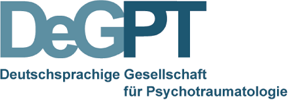
Several vivo-members presented vivo’s work on the 18. annual meeting of the german speaking society for psychotraumatology (DeGPT) from 10. to 12. March 2016.
Dr. Maggie Schauer promotes in her lecture “Mental health first!” a paradigm shift in the care systems for refugees in Germany. Dr. Thomas Elbert presented the trauma-work with street children, gangs, former child soldiers and unaccompanied minor refugees. Dr. Tobias Hecker talked in two symposia about trauma and memory as well as trauma and violence.

Several vivo-members presented vivo’s work on the 18. annual meeting of the german speaking society for psychotraumatology (DeGPT) from 10. to 12. March 2016.
Dr. Maggie Schauer promotes in her lecture “Mental health first!” a paradigm shift in the care systems for refugees in Germany. Dr. Thomas Elbert presented the trauma-work with street children, gangs, former child soldiers and unaccompanied minor refugees. Dr. Tobias Hecker talked in two symposia about trauma and memory as well as trauma and violence.
German-African research workshop
for innovation in African health care systems
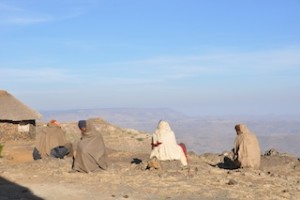
In February, the first German-African research workshop for innovation in African health care systems took place in Nairobi.
The workshop received high interest. In total, 54 participants and representatives from seven national and six international societies came together including African and German clinicians, scientists, representatives from universities and NGOs, well established researchers and talented young academics who could be supported with travel grants.
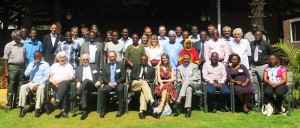
In 27 presentations and three round table discussions epidemiological aspects of mental health care for refugees as well as current challenges in health care systems were discussed in order to find new methods for innovation in health care and treatment.
The participants compiled the Nairobi Position Statement on Refugee and IDP Mental Health Care, which provides recommendations for further steps for improving mental health care in African countries.
for innovation in African health care systems

In February, the first German-African research workshop for innovation in African health care systems took place in Nairobi.
The workshop received high interest. In total, 54 participants and representatives from seven national and six international societies came together including African and German clinicians, scientists, representatives from universities and NGOs, well established researchers and talented young academics who could be supported with travel grants.

In 27 presentations and three round table discussions epidemiological aspects of mental health care for refugees as well as current challenges in health care systems were discussed in order to find new methods for innovation in health care and treatment.
The participants compiled the Nairobi Position Statement on Refugee and IDP Mental Health Care, which provides recommendations for further steps for improving mental health care in African countries.
The Mass Refugee Movement – Better Reframed as Mental Health Crisis?
Dr Maggie Schauer’s thoughts on the current refugee movement, the causes of migration and flight as well as its consequences on mental health published in the ISTSS stress points, a quarterly news letter for ISTSS members. To read the article, please follow this link.
Dr Maggie Schauer’s thoughts on the current refugee movement, the causes of migration and flight as well as its consequences on mental health published in the ISTSS stress points, a quarterly news letter for ISTSS members. To read the article, please follow this link.
Happy birthday vivo!
Fifteen years ago on April 4th vivo was founded in Italy.
Happy birthday to all vivos around the world!
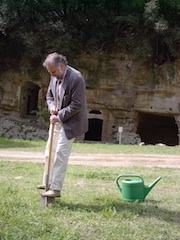
Expressing the inexpressible

According to Amnesty International, torture is still practised in over 140 countries – with purported aims ranging from the extortion of confessions to attempts at demonstrating the alleged successes of criminal and political investigations. Despite these claims, however, the actual goal of the torturers is often the destruction of the victim’s personality and identity.

According to Amnesty International, torture is still practised in over 140 countries – with purported aims ranging from the extortion of confessions to attempts at demonstrating the alleged successes of criminal and political investigations. Despite these claims, however, the actual goal of the torturers is often the destruction of the victim’s personality and identity.
Family violence and trauma
Catani, C., Sossalla, I. (2015).
Child abuse predicts adult PTSD symptoms among individuals diagnosed with intellectual disabilities.
Frontiers in Psychology, 6:1600.
Crombach, A., Bambonyé, M. (2015).
Intergenerational violence in Burundi: Experienced childhood maltreatment increases the risk of abusive child rearing and intimate partner violence.
European Journal of Psychotraumatology, 6:26995.
Saile, R., Ertl, V., Neuner, F., Catani, C. (2015).
Children of the postwar years: A two-generational multilevel risk assessment of child psychopathology in northern Uganda.
Development and Psychopathology.
Sriskandarajah, V., Neuner, F., Catani, C. (2015).
Predictors of Violence Against Children in Tamil Families in Northern Sri Lanka.
Social Science and Medicine, 146:257-265.
Catani, C., Sossalla, I. (2015).
Child abuse predicts adult PTSD symptoms among individuals diagnosed with intellectual disabilities.
Frontiers in Psychology, 6:1600.
Crombach, A., Bambonyé, M. (2015).
Intergenerational violence in Burundi: Experienced childhood maltreatment increases the risk of abusive child rearing and intimate partner violence.
European Journal of Psychotraumatology, 6:26995.
Saile, R., Ertl, V., Neuner, F., Catani, C. (2015).
Children of the postwar years: A two-generational multilevel risk assessment of child psychopathology in northern Uganda.
Development and Psychopathology.
Sriskandarajah, V., Neuner, F., Catani, C. (2015).
Predictors of Violence Against Children in Tamil Families in Northern Sri Lanka.
Social Science and Medicine, 146:257-265.
Recent studies about NET
Ertl, V., Pfeiffer, A., Schauer, E., Elbert T, Neuner, F. (2011).
Community-implemented trauma therapy for former child soldiers in Northern Uganda: a randomized controlled trial.
JAMA, 306(5), 503-12.
Jacob, N., Neuner, F., Mädl, A., Schaal, S., & Elbert, T. (2014).
Dissemination of psychotherapy for trauma-spectrum disorders in resource-poor countries: a randomized controlled trial in Rwanda.
Psychotherapy & Psychosomatics.
Pabst, A., Schauer, M., Bernhardt, K., Ruf, M., Goder, R., Rosentraeger, R., Elbert, T., Aldenhoff, J. & Seeck-Hirschner, M. (2012).
Treatment of patients with borderline personality disorder and comorbid posttraumatic stress disorder using Narrative Exposure Therapy: a feasibility study.
Psychotherapy and Psychosomatics, 81, 61-63.
Robjant, K. & Fazel, M. (2010).
The emerging evidence for Narrative Exposure Therapy: a review.
Clin Psychol Reviews, 30, 8,1030-9.
Stenmark, H., Catani, C., Neuner, F., Elbert, T., & Holen, A. (2013).
Treating PTSD in refugees and asylum seekers within the general health care system. A randomized controlled multicenter study.
Behaviour research and therapy, Vol 51(10), 641-647.
Ertl, V., Pfeiffer, A., Schauer, E., Elbert T, Neuner, F. (2011).
Community-implemented trauma therapy for former child soldiers in Northern Uganda: a randomized controlled trial.
JAMA, 306(5), 503-12.
Jacob, N., Neuner, F., Mädl, A., Schaal, S., & Elbert, T. (2014).
Dissemination of psychotherapy for trauma-spectrum disorders in resource-poor countries: a randomized controlled trial in Rwanda.
Psychotherapy & Psychosomatics.
Pabst, A., Schauer, M., Bernhardt, K., Ruf, M., Goder, R., Rosentraeger, R., Elbert, T., Aldenhoff, J. & Seeck-Hirschner, M. (2012).
Treatment of patients with borderline personality disorder and comorbid posttraumatic stress disorder using Narrative Exposure Therapy: a feasibility study.
Psychotherapy and Psychosomatics, 81, 61-63.
Robjant, K. & Fazel, M. (2010).
The emerging evidence for Narrative Exposure Therapy: a review.
Clin Psychol Reviews, 30, 8,1030-9.
Stenmark, H., Catani, C., Neuner, F., Elbert, T., & Holen, A. (2013).
Treating PTSD in refugees and asylum seekers within the general health care system. A randomized controlled multicenter study.
Behaviour research and therapy, Vol 51(10), 641-647.
Research on traumatic stress and asylum seekers
Neuner, F., Kurreck, S., Ruf, M., Odenwald, M., Elbert, T., Schauer, M.(2010).
Can asylum-seekers with posttraumatic stress disorder be successfully treated? A randomized controlled pilot study.
Cogn Behav Ther, 39(2), 81-91.
Ruf, M., Schauer, M., Neuner, F., Catani, C., Schauer, E., Elbert, T.(2010).
Narrative exposure therapy for 7- to 16-year-olds: A randomized controlled trial with traumatized refugee children.
Journal of Traumatic Stress.
Neuner, F., Kurreck, S., Ruf, M., Odenwald, M., Elbert, T., Schauer, M.(2010).
Can asylum-seekers with posttraumatic stress disorder be successfully treated? A randomized controlled pilot study.
Cogn Behav Ther, 39(2), 81-91.
Ruf, M., Schauer, M., Neuner, F., Catani, C., Schauer, E., Elbert, T.(2010).
Narrative exposure therapy for 7- to 16-year-olds: A randomized controlled trial with traumatized refugee children.
Journal of Traumatic Stress.
Center of Excellence for Psychotraumatology
An innovative Center of Excellence for Psychotraumatology has been established by the University of Konstanz, Department of Psychology, at the Chair of Clinical Psychology and Chair of Clinical and Neuropsychology, situated at the Centre for Psychiatry Reichenau, Germany. The research clinic collaborates with vivo and focuses on the treatment of refugees who have suffered traumatic events. The present initiative of the clinic is supported by the European Refugee Fund/ Europaeischer Fluechtlingsfonds/ EFF, which aims to assist refugees who have come to Germany seeking asylum, many of whom suffer from post traumatic stress.
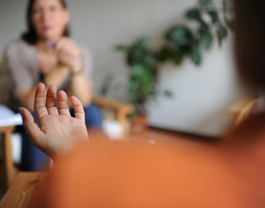
Follow the link to find out more.
An innovative Center of Excellence for Psychotraumatology has been established by the University of Konstanz, Department of Psychology, at the Chair of Clinical Psychology and Chair of Clinical and Neuropsychology, situated at the Centre for Psychiatry Reichenau, Germany. The research clinic collaborates with vivo and focuses on the treatment of refugees who have suffered traumatic events. The present initiative of the clinic is supported by the European Refugee Fund/ Europaeischer Fluechtlingsfonds/ EFF, which aims to assist refugees who have come to Germany seeking asylum, many of whom suffer from post traumatic stress.

Follow the link to find out more.
Planning workshop for DDR programs in Switzerland
In May 2010 vivo was invited by the United Nations Development Program (UNDP) and the Norwegian Defence University College (NODEFIC) to share its expertise to plan a training for gender-sensitive Demobilization, Disarmament and Reintegration Programmes (DDR).
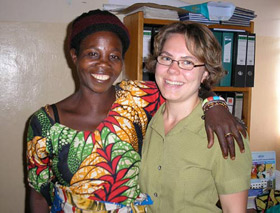
Lesen Sie weiter: Planning workshop for DDR programs in Switzerland
In May 2010 vivo was invited by the United Nations Development Program (UNDP) and the Norwegian Defence University College (NODEFIC) to share its expertise to plan a training for gender-sensitive Demobilization, Disarmament and Reintegration Programmes (DDR).

Continue reading: Planning workshop for DDR programs in Switzerland


